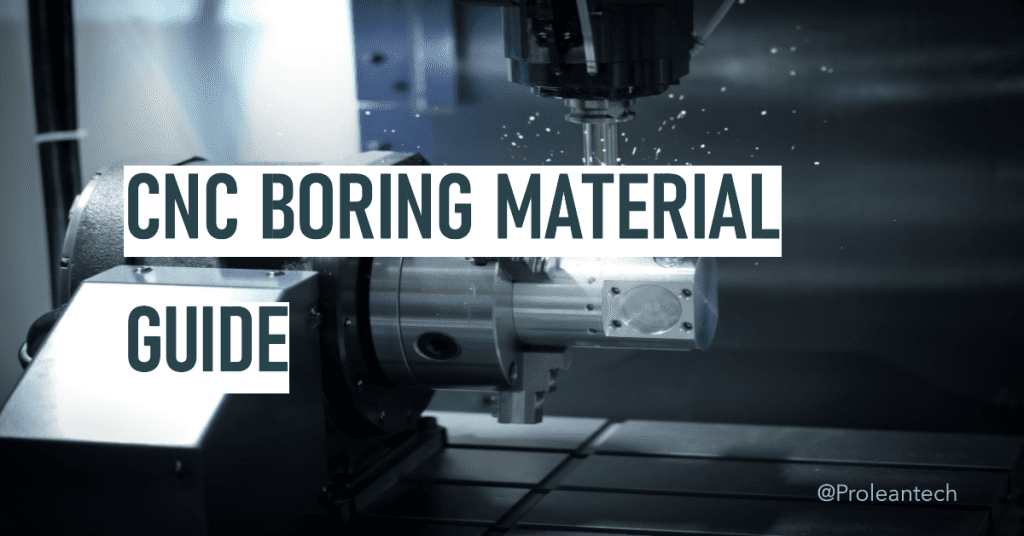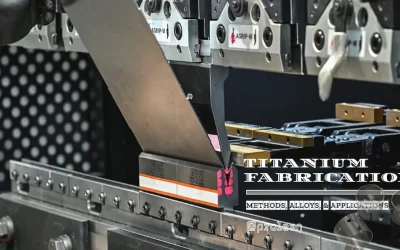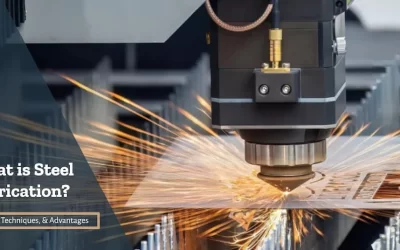
Boring machining operation is a crucial process that plays a significant role in the manufacturing industry. It involves creating precision components with intricate internal geometries that require careful attention to detail. When it comes to CNC boring, selecting the appropriate material is essential for ensuring the success of your operations. The material must be strong and durable, and withstand the heat and pressure generated during the machining process. Additionally, there could be other requirements based on the specifications and intended use of the final components.
This comprehensive guide will discuss the factors that influence material selection, explore the most commonly used materials in CNC boring, and provide expert tips for making the right choice.
Factors to Consider When Selecting CNC Boring Material
When it comes to CNC boring projects, selecting the appropriate material is essential for ensuring the success of your operations. This section will discuss the factors that influence material selection, including material properties, machinability, cost, and availability. Let’s discuss each of them in detail.
Material Properties
- Strength: The strength of the material determines its ability to withstand external forces without deforming or breaking. Stronger materials generally require slower cutting speeds and may demand more advanced tooling.
- Hardness: Hardness refers to the material’s resistance to indentation or scratching. Harder materials can be more challenging to machine, resulting in increased tool wear and longer processing times.
- Ductility: Ductility is a material’s ability to deform under tensile stress without breaking. Ductile materials are generally more forgiving during the machining process, allowing for tighter tolerances and better surface finishes.
- Thermal Properties: Thermal properties are important in CNC boring because they affect how the material responds to heat during machining. Materials with low thermal conductivity may warp or deform due to heat buildup, leading to inaccuracies and defects in the final components. In contrast, materials with high thermal conductivity can dissipate heat and prevent these problems.
Machinability
Different materials have varying levels of machinability, which can affect the selection of boring tools, the frequency of tool changes, and the overall efficiency of machining process. For example, some materials can cause tools to wear more rapidly, necessitating more frequent tool changes and leading to increased production costs. Additionally, materials that generate higher cutting forces may require more rigid machine setups and tooling to ensure accurate results, which can add to production costs.
Moreover, the machinability of the material can significantly influence the surface finish. Some materials are more challenging to the machine to a smooth and precise finish than others.
Cost and Availability
- Material Cost: The cost of the raw material can significantly impact the overall cost of the project, making it a crucial factor to consider during material selection.
- Availability: Materials that are readily available and easily sourced can help reduce lead times and streamline the production process.
Other factors
Other factors to consider when selecting CNC boring materials include the required tolerances, surface finish, corrosion resistance, and environmental factors such as temperature and humidity. These factors can impact the performance and durability of the final components, making them important considerations during material selection.
Read more: Boring Vs Drilling
Common CNC Boring Materials
CNC boring operations use several materials, including aluminum, steel, brass, plastics, and composites. Each material has its own properties and can benefit a range of applications.
Metals
| Metals | Description | Applications |
|---|---|---|
| Aluminum | Lightweight with good strength-to-weight ratio and excellent machinability | Aerospace, automotive, and electronics industries |
| 6061 Aluminum | Excellent weldability and corrosion resistance | Structural Components and general-purpose applications |
| 7075 Aluminum | High strength-to-weight ratio and good fatigue resistance | Highly stressed parts in aerospace and defense applications |
| Steel | Versatile material with high strength and durability | General-purpose applications and structural components |
| Carbon Steel | Balance of strength, hardness, and machinability | General-purpose applications and structural components |
| Stainless Steel | Excellent corrosion resistance | Harsh environments or applications where durability is critical |
| Brass | Copper-zinc alloy with excellent machinability | Precision components in electronics, automotive, and aerospace industries |
Plastics
Plastics are a versatile material option for CNC boring operations. They offer a range of properties, including excellent machinability, wear resistance, and dimensional stability. Acetal, nylon, and polycarbonate are common plastics used in CNC boring, each with unique characteristics that make them suitable for several applications.
| Plastics | Description |
|---|---|
| Acetal | A durable and rigid plastic with excellent machinability, making it suitable for CNC boring operations. They are commonly used in applications that require dimensional stability, low friction, and high wear resistance, such as gears, bushings, and rollers. |
| Nylon | A versatile plastic with excellent wear resistance, low friction, and good machinability. Its strength and durability make it suitable for a wide range of applications, including bearings, gears, and fasteners. |
| Polycarbonate | A robust and transparent plastic that offers excellent impact resistance and dimensional stability. Commonly used in applications that require high strength and optical clarity, such as lenses, machine guards, and displays. |
Other plastics commonly used in CNC boring include PVC, HDPE, and PTFE. PVC is chemically resistant and a good insulator for piping, electrical components, and signage. HDPE is lightweight and durable, offering excellent resistance to chemicals and impacts, commonly used in bottles, containers, and pipes. PTFE (Teflon) is a high-performance plastic with excellent chemical resistance, low friction, and high-temperature resistance, commonly used in high-purity applications like medical and laboratory equipment, as well as the aerospace and electrical industries.
Composites
| Composite Materials | Description and Applications |
|---|---|
| Carbon Fiber Reinforced Polymer (CFRP) | Combines carbon fibers with a polymer matrix, offering high strength-to-weight ratio, excellent stiffness, and corrosion resistance. Widely used in aerospace, automotive, and sporting goods industries. |
| Fiberglass Reinforced Polymer (FRP) | Combines glass fibers with a polymer matrix, providing excellent strength, durability, and corrosion resistance. Commonly used in applications such as marine, automotive, and infrastructure. |
Try Prolean Now!
Tips for Choosing the Right Material for Your CNC Boring Project
- Evaluate machinability: Consider the material’s machinability and its impact on tool wear, cutting forces, surface finish, and the ability to achieve tight tolerances.
- Assess cost and availability: Weigh the material’s cost and availability against your project’s budget and lead time requirements, prioritizing materials that are both affordable and easily accessible.
- Material compatibility: Ensure the chosen material is compatible with other materials in the assembly or application to avoid issues like galvanic corrosion or thermal expansion mismatches.
- Consult experts: Seek guidance from material experts and CNC boring service providers to ensure the selected material is appropriate for your project.
- Analyze environmental conditions: Consider the operating environment of the final part, including temperature, humidity, and potential exposure to chemicals or corrosive substances.
- Factor in post-processing requirements: Be aware of any post-processing needs, such as heat treatments, coatings, or surface finishes, which may affect material selection.
- Review industry-specific standards and regulations: Ensure that the chosen material complies with any industry-specific standards, regulations, or certifications that may apply to your project.
- Perform material testing: Conduct material testing, such as tensile or hardness tests, to verify the chosen material’s properties and suitability for your application before beginning the CNC boring process.
Prolean’s CNC Boring Service: Your Partner for Success
At Prolean, we provide a comprehensive set of CNC machining services, including boring. Our team of experienced professionals is well-versed in material selection and CNC boring operations, and they are always ready to offer their expert guidance to ensure that your projects are executed with the utmost precision and efficiency.
Our advanced machining factory and custom tooling approach can deliver the highest levels of accuracy and quality, regardless of the material or application. This allows us to tackle even the most challenging projects with confidence.
Furthermore, we understand the importance of meeting your exact specifications. That is why we have implemented stringent quality control measures and rigorous testing procedures to ensure that every part we produce meets the highest standards of quality. Our commitment to excellence is unwavering, and we guarantee that you will be satisfied with our work.
Conclusion
Selecting the right material for your CNC boring project is a crucial step in achieving the desired results. It is a process that requires careful consideration, as the material you choose will have a significant impact on the final product’s quality, functionality, and durability.
When choosing a material for your CNC boring project, consider its hardness, composition, cost, availability, and environmental impact.
Stronger materials like steel and titanium are more durable but difficult to work with, while softer materials like aluminum and copper are easier to machine but less durable. The composition of the material affects its properties and machinability. Other factors to consider include cost, availability, and environmental impact. By evaluating these factors, you can choose the right material for your project that meets all your requirements while keeping costs down and minimizing environmental impact.
FAQs
What factors should I consider when selecting a material for my CNC boring project?
When selecting a material for your CNC boring project, consider factors such as material properties (strength, hardness, ductility), machinability (tool wear, cutting forces, surface finish), cost, and availability.
What are some common materials used in CNC boring?
Common materials used in CNC boring include metals (aluminum, steel, brass), plastics (acetal, nylon, polycarbonate), and composites (carbon fiber reinforced polymer, fiberglass reinforced polymer).
How can I ensure the chosen material is suitable for my CNC boring project?
Consult with material experts, CNC boring service providers, or consultants to ensure that the chosen material is suitable for the intended application.
How does material selection impact the success of my CNC boring project?
Material selection directly impacts the machining process, tool wear, surface finish, and the overall quality and performance of the final components.




0 Comments